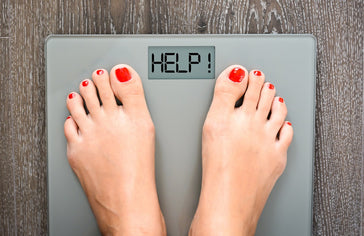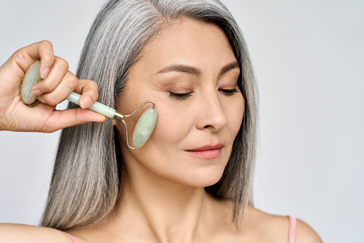Staying ‘VEGGIE’ on KETO (Here’s How!)
Posted by Support CoBionic on
Hey everybody! I'm Becky Williams, and I am happy today to bring you the topic of Eating Vegetarian on Keto. Now, it is definitely a myth that keto is just for meat with very few vegetables. Granted, there are other places that do have this type of eating plan, but for us, that is not what we think of when we think of keto.
A well-balanced keto diet is loaded with nutritious, low-carb vegetables. In fact, many people do thrive on a vegetarian lifestyle, even though they want to stay keto as well. So if you are already a vegan or already a vegetarian and you want to try keto, then I have the answer for you today, okay? You can get all the benefits of keto without having to eat meat and without having to consume very little vegetables. In fact, we want you to eat a lot of vegetables.
Okay, so if you want to start transitioning into a more plant-based lifestyle, let's say you're already eating keto, I suggest that you make keto vegetarian recipes one day each week so you can start slowly. For us, like we like to do meat-free Mondays, that works for our family. It's also a budget-friendly thing because not having meat on that dinner night means that we can save a little bit of money on that meal. Many vegetarians will still eat eggs and dairy as part of their diet, but there's a lot of misinformation here. Eggs are considered unhealthy, while dairy has been labelled as a superfood. We don't agree with that messaging, okay?
Eggs are a great source of protein and essential vitamins as well as amino acids. In fact, each egg contains 7 grams of protein, that's pretty good, and 5 grams of healthy fat. And yes, eat the yolk, don't just do egg whites. On the other hand, while dairy may be considered a source of protein, it does have higher health risk. It's a risk that a lot of times outweigh the benefits. And I have talked about being dairy-free in the past, so this just kind of touches on that again. So one thing that you could do, though, is enjoy a nut cheese. And I've had these that are very, very good. Thankfully, they're more readily available now, whereas a couple years ago, you couldn't really find good substitutes without having to do soy, and I'm going to talk about soy also in a minute.
Also, here are a couple quick tips for you if you are going to try vegetarian keto. One is avoid high-processed foods. That's our rule for everything, but especially with this, because it is a lot more difficult to find vegetarian options that aren't super processed. Just because the package says that it's vegetarian doesn't mean that it's healthy, okay? Oreos and Ritz crackers are vegetarian, but I don't think that you would say they're healthy, and I know. I'm sorry to bring this bad news to you. I know whenever I went vegan for a little while, I was just trying out different eating styles because nothing was working. I would eat Oreos like every single day. I'm like, “oh. Man, they're gluten-free. They're dairy-free, and they're not healthy, okay?” So just because it fits the criteria of being vegetarian doesn't mean that it's going to be healthy.
The next tip is to increase high-quality fats from sources like healthy oils, avocados, flax seeds, all great things. Make sure to eat plenty of high-quality protein like eggs, high-protein vegetables, nut-based cheeses like I was talking about earlier. All those are great options. Also, ditch the peanut butter. I know. A lot of people think that peanut butter is a nut, but it's actually a legume, all right? So a lot of vegetarians are going to eat peanut butter and legumes for protein, but they're not as healthy as you might think that they are. So let's try to stay away from those.
Also, be sure to hit your macros each day, which remember is fat, carbs, and I'm about to say fiber. Fat, carbs, and protein. Fiber is important, too, for a well-balanced keto diet.
The biggest tip that I have, if you are vegan and you're thinking about following a keto diet, it's to get the recommended amount of protein every single day. We don't want your body to be borrowing protein from your muscles to be able to stay sustained, okay? You can use like an online calculator to do this. There are different apps. A lot of people like, what's the app that a lot of people like? MyFitnessPal is okay, but if you're counting carbs, it's a little bit tricky, and a lot of it is not spot on with their information. Carb Manager is one that I see a lot of people that like. I personally like Dr. Mercola's online calculator, I mean, the app. There are other online calculators, I know Keto Summit has one. So there are options to find out exactly how many carbs, how many proteins, and how many fats you should be eating. Of course, our meal plans spell it out for you for what like a basic day would be.
Remember, our meal plans are not tailored to be for you specifically. They're a really good baseline. So if you feel like you're still hungry, you might need a little bit more food. If you feel like you're not able to finish it all, maybe you need to decrease. I doubt that you'll have to decrease, because like I said, we're pretty basic on our macros, but just know that if you're feeling a little bit hungry still, you're welcome to change those meal plans up just a little bit, add in more fiber, add in more vegetables, to help you to be more sustained. All right.
Also, I want to talk about soy. Soy is really big for vegans and vegetarians, because it seems like a good option, like if you're going to do tofu, or you're going to do tempeh, things like that. The problem is soy is not as healthy as a lot people make it out to be, and so we don't really recommend it. There are plenty of soy-free vegan keto diet recipes that can give you the protein, though. So don't despair. There are still really good options for you. Things like protein-rich vegetables. So, an example of that would be like artichokes, asparagus, broccoli, brussel sprouts, kale, spinach, all of those are low-carb veggies that are good sources of protein.
Also, nuts and nut butters are a really good vegan protein. Almonds, pistachios, they have 20 grams of protein per 100-gram serving. That's a lot. Cashews and walnuts are not far behind. They have 15 grams of protein per 100-gram serving. Definitely going to be able to get your protein in with those things. Seeds and seed butters have even more protein than nuts and nut butters. You have hemp seeds, pumpkin seeds. I love both of those. Both of those have 30 grams of protein per 100-gram serving. Flax seeds and sesame seeds aren't far behind with 20 grams protein per 100-gram serving.
Spirulina, which is blue-green algae, it's pretty but it's also another source of protein. It has 4 grams of protein per tablespoon and 57 grams of protein per 100-gram serving. I don't know that I've ever had 100 grams of spirulina before, but at least you have the facts, right? Adding just a couple tablespoons to something is usually the route that I'm going to go, like in a smoothie or something. Okay. So then also pea protein powders. These are one of the most widely used for a vegan protein source. So if you're making things like smoothies for your breakfast, this would be a source for you. Unflavored pea protein powders can easily also be added to sauces and soups and stews. It can increase your protein content without affecting the taste of the food. So that's really good.
So do you have a favorite recipe or a favorite protein that you use for your ketogenic diet when you're working to be a vegetarian or a vegan? What is your favorite? Let me know. Hop on over to the Facebook group or send me a quick email and let's chat. Thanks again, and I'm going to see you next week with another bonus video. Bye, guys. Be well.





